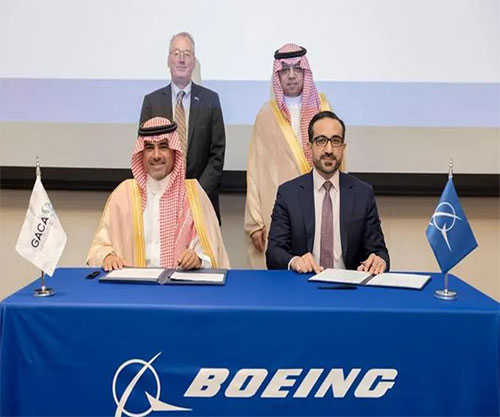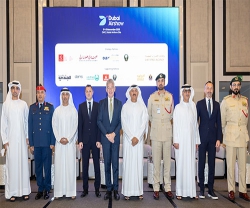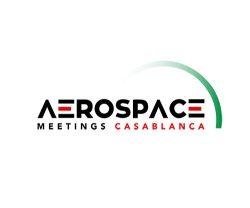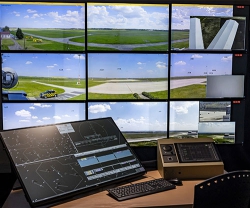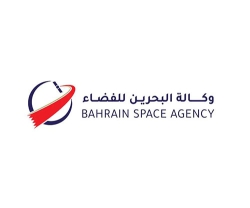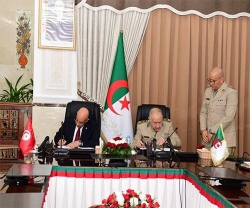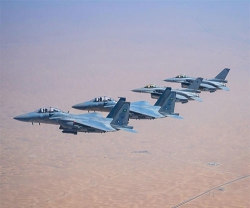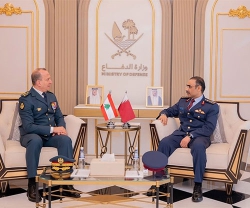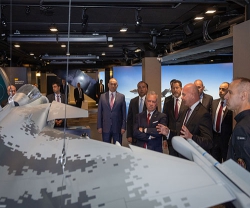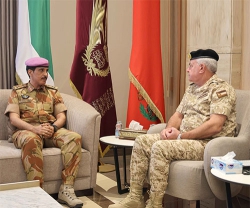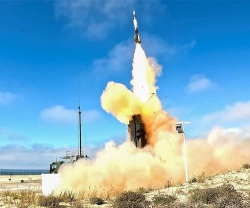Ties between Saudi Arabia and the United States were further strengthened in the aviation sector during a visit to the US by a delegation from the Saudi civil aviation sector, led by His Excellency Abdulaziz bin Abdullah Al-Duailej, President of the General Authority of Civil Aviation (GACA).
The delegation visited the Federal Aviation Administration (FAA) and the headquarters of Boeing in Washington DC, as well as the Dreamliner facility in Charleston, South Carolina, one of the company’s largest and most advanced worldwide hubs.
Collaboration opportunities in civil aviation, aircraft manufacturing and maintenance services, sustainability, and advanced technologies initiatives were among the many topics discussed across the two-day visit, GACA said in a statement.
The visit aimed to enhance cooperation with the United States in knowledge exchange, technology transfer, and localization of the aviation industry, in line with the Kingdom’s goal of becoming a global industrial and logistics hub in aviation as part of its economic diversification, as set out in Vision 2030.
“By engaging with global aviation regulators and manufacturers, GACA is supporting Vision 2030 objectives to strengthen Saudi Arabia’s role as a hub connecting three continents, delivering greater connectivity and travel experiences for the Kingdom’s passengers,” said GACA President, His Excellency Abdulaziz bin Abdullah Al-Duailej.
“With new Saudi airlines being launched, record aircraft orders, and a focus on innovation and sustainability, the visit highlights the unprecedented opportunities being created by the Kingdom and underscores the strong Saudi–U.S. aviation partnership,” he added.
During the delegation’s tour of Boeing’s Dreamliner facility in Charleston, GACA signed a Memorandum of Understanding (MoU) with Boeing in the field of sustainability and advanced air mobility. The agreement was signed by Captain Sulaiman Al-Muhaimidi, GACA’s Executive Vice President for Aviation Safety and Environmental Sustainability, and Mr. Asaad Al-Jomoai, President of Boeing Saudi Arabia.
“This partnership with Boeing reflects GACA’s commitment to creating safer, smarter skies through advanced air mobility innovation. The effort further cements Saudi Arabia at the forefront of the future of aviation,” said GACA’s Executive Vice President.
GACA President separately signed a Memorandum of Understanding (MoU) for technical cooperation with the African Civil Aviation Commission (AFCAC) on Monday at the International Civil Aviation Organization (ICAO) 42nd General Assembly taking place from September 23 to October 3 in Montreal, Canada.
During the event, attended by a high-level delegation headed by Minister of Transport and Logistic Services Saleh Al-Jasser, the Kingdom announced its intention to seek re-election to the ICAO Council in Category II for the 2025-2028 term, reaffirming its role as an active member and key partner in shaping international civil aviation policies.
Speaking at the opening of the 42nd General Assembly of ICAO, the Saudi Minister of Transport and Logistic Services and General Authority of Civil Aviation (GACA) Chairman, announced a $1 million donation from King Salman bin Abdulaziz Al Saud, Custodian of the Two Holy Mosques, to support the ICAO’s “No Country Left Behind” programme for the 2025-2028 cycle, which helps developing countries implement civil aviation safety and security standards, the Saudi Press Agency (SPA) reported.
Minister Al Jasser emphasised Saudi Arabia’s leading role in the global aviation sector and noted that the Kingdom is an influential force in regional and international aviation, ranking among the top countries in aviation safety and security. He said that Saudi Arabia has strong cooperative relations with ICAO and has actively contributed to developing global policies and practice.
He further highlighted the Kingdom’s aviation programme, part of the National Transport and Logistics Strategy, which aims to transport over 330 million passengers annually by 2030, connect the Kingdom to 250 international destinations, attract investments exceeding $100 billion, develop key infrastructure like King Salman International Airport with a capacity of 120 million passengers, and train over 50,000 professionals in the sector by 2030.

